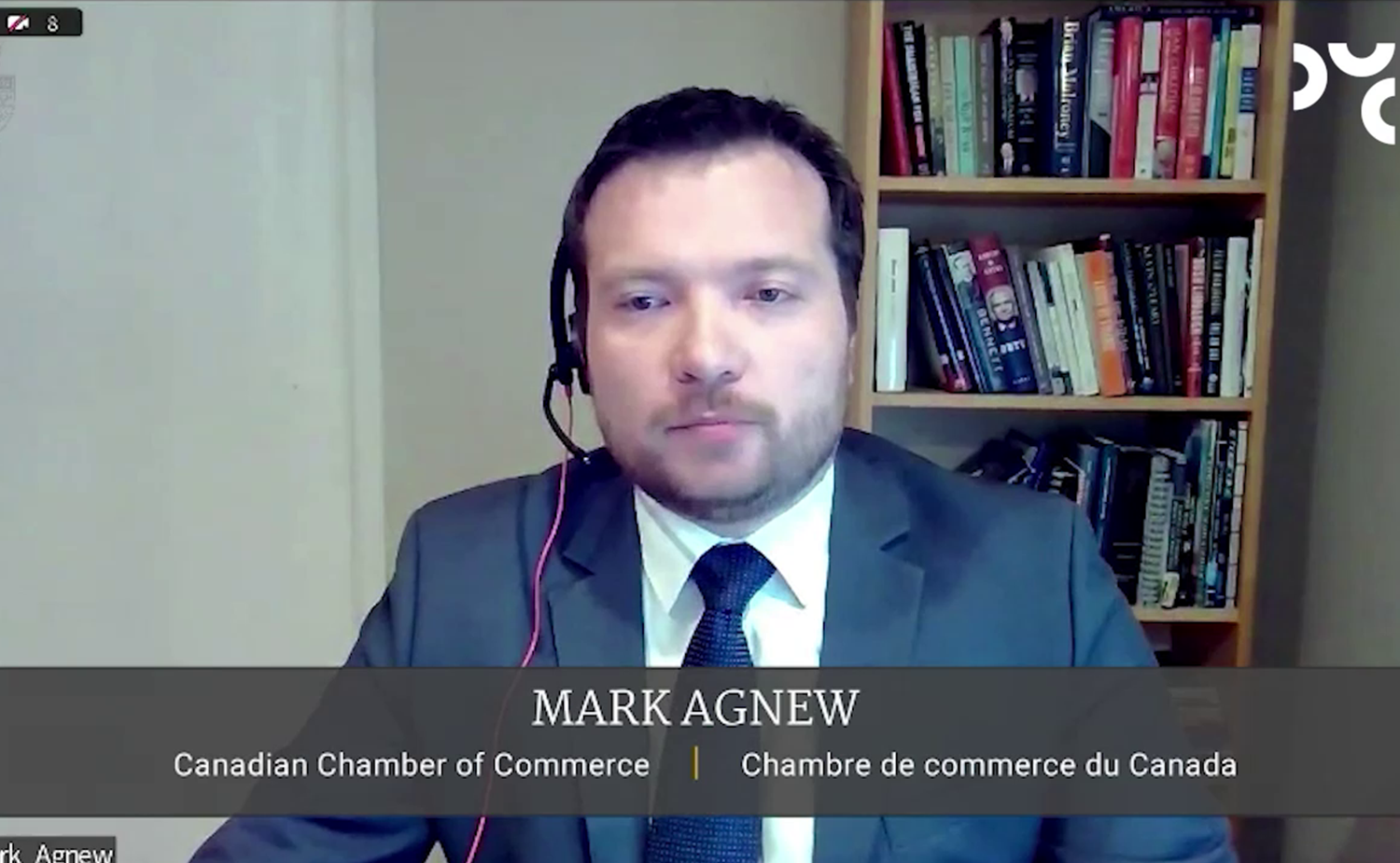Blog /
Canadian Chamber appears at House Finance Committee, highlighting key priories for Bill C-8
Canadian Chamber appears at House Finance Committee, highlighting key priories for Bill C-8
On February 17, 2022 the Canadian Chamber’s Senior Vice President, Policy and Government Relations, Mark Agnew, appeared at the House...

On February 17, 2022 the Canadian Chamber’s Senior Vice President, Policy and Government Relations, Mark Agnew, appeared at the House of Commons Standing Committee on Finance as part of the Committee’s study of Bill C-8, The Economic and Fiscal Update. Agnew highlighted several areas of importance for the Canadian business community.
Mark Agnew’s opening statement:
Check again delivery.
Chair and Honourable members, it is a pleasure to be back at this committee.
The Economic and Fiscal Update – which I will called EFU for short – included a number of critical elements for Canadian businesses. I want to focus my remarks on both a few elements in the Bill C-8 but also from broader EFU.
The first element where I want to underscore our support for is the funding for rapid tests. The Canadian Chamber has seen firsthand the benefits of rapid testing. Through the Canadian Chamber rapid testing initiative we have seen over 8 million test kits distributed across the country through local chambers. Simply put, these kits are keeping businesses open and increasing employee and customer confidence. We believe rapid tests need to remain a critical part of the toolkit of navigating the endemic existence of COVID.
The second element where we want to voice support is related to Small Businesses Air Quality Improvement Tax Credit. Given the transmission vectors for COVID, we need to maintain support for ventilation to again ensure safe workplaces that can build confidence as consumer facing businesses start to ramp up allowable capacity limits.
The third element I want to briefly mention is the refundable tax credit to support farmers. Climate change’s impact on agriculture has given the industry a stake in taking action and they are ready to do their part. However, inflationary costs are affecting farmers, who face unique needs. The credit in Bill C-8 is a welcome a start, but some in the industry will need more. For example, in harsh climates where grain drying is important or heating for livestock is needed, higher proportions of carbon-based energy products are used. We encourage Parliament to look at how to build on C-8 going forward, such as studying Bill C-234.
Shifting to the broader contents of the EFU, I want to highlight a few other areas.
We were glad to see a commitment to extend the HASCAP programs given the challenges still facing businesses as well as the streamlined deduction for home office exemptions, particularly given expectations around remote working that will continue for this calendar year.
We also noted the speech on the EFU and the subsequent extension of the CEBA repayment to December 2023. While a welcome step, we hope this can be extended to December 2024. This was endorsed by delegates at last year’s AGM and ensures sufficient repayment timelines for the hardest hit sectors.
We noted the government’s continued intent in the EFU to move ahead with a digital services tax, which was affirmed in the Ways and Means motion on the Digital Services Tax Act that was tabled. The Chamber continues to have concerns with not only design features in the bill – but also the retroactive application and the issues it poses in our relationship with the US. We hope that the government will prioritize efforts on the multilateral deal.
Finally, we also noted that the EFU underscored the government’s intent to move ahead with a tax incentive for carbon capture, utilization and storage. This is welcome news. As our country makes the transition towards Net Zero 2050, there is no panacea. We need a range of tools and CCUS will be critical for the realities of the Canadian economy, not only for the oil and gas sector, but also for other industrial sectors like fertilizer, cement, and utilities. The tax credit design and rates need to ensure the credit is viable. While CCUS is not the silver bullet, there is no viable pathway for our country that does not spotlight CCUS.
Thank you again for the opportunity to address the Committee and I look forward to your questions.
Related News

Time to put reports into action, Chamber tells House Agriculture Committee

2022 Q3 Canadian Survey on Business Conditions: Inflation is the top issue. Labour pains intensifying, but price pressures and supply chains issues are improving




